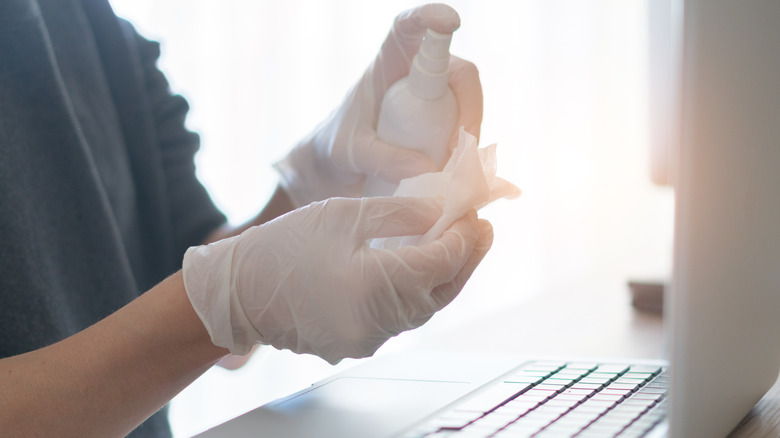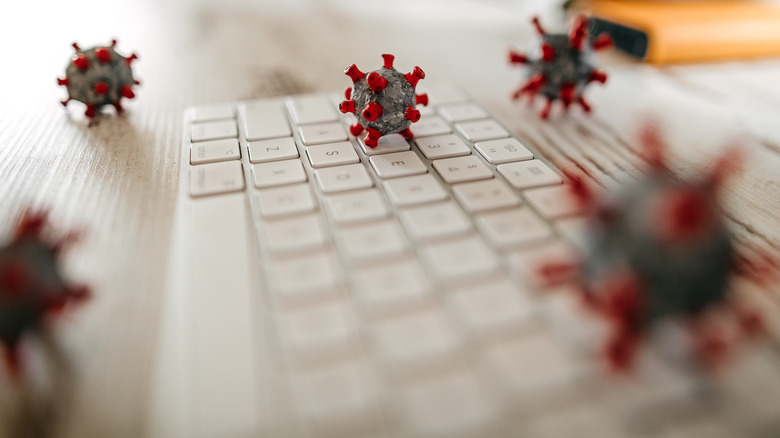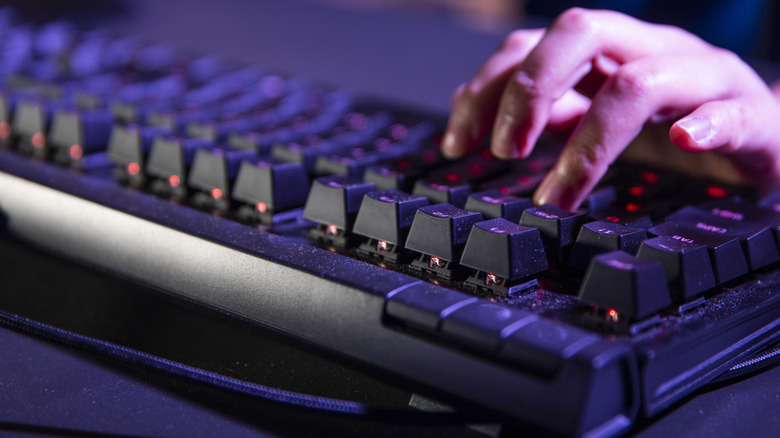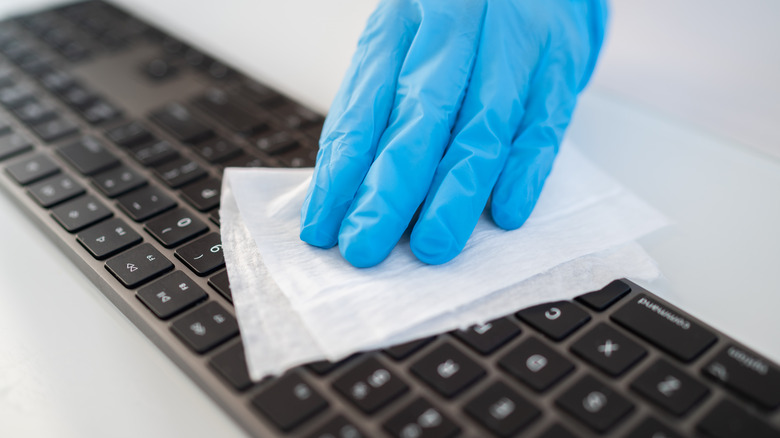The Unexpected Consequences Of Not Cleaning Your Computer's Keyboard
A keyboard can be a sorely underappreciated part of your computing kit. While a rig can have all manner of sophisticated components under the hood, and mechanical keyboards with gamer-friendly key arrangements are available, they're not always a priority. A standard-issue keyboard will happily QWERTY its way through a workday.
Or will it? As with mice, it can be easy to log in, type/click away, log off, and then repeat, paying little attention to the wear-and-tear these crucial computing components endure every day. Yes, we'll wipe the surface of the keys when they become visibly grimy (or when we remember to do so), but is keyboard care always at the front and center of our minds? Perhaps not, but perhaps it should be, like any other everyday cleaning task.
You may not expect it, but failing to keep your keyboard clean can have some unfortunate implications for its lifespan and even potentially your own. Let's take a look at the dangers associated with such.
The health risks
Of course, it's news to nobody that offices, desks, and computers tend to be focal points of many of our lives. Statista reports that, as of September 2023, the average working week in the United States was 34.4 hours long. For many of those hours, a lot of those people were typing away on a computer. For the keyboard, this can mean an awful lot of germs.
We're often told that surfaces such as desks, keyboards, smartphone screens, and any others we touch frequently can harbor lots of germs. How many? In a 2014 Initial Hygiene video, Dr. Lisa Ackerley of the Royal Society of Public Health stated, "3,000 organisms can be found per square inch on a keyboard," and they're not particularly friendly guests.
In October 2018, the study "Degree of Bacterial Contamination of Mobile Phone and Computer Keyboard Surfaces and Efficacy of Disinfection with Chlorhexidine Digluconate and Triclosan to Its Reduction," by Jana Koscova et al (Int J Environ Res Public Health via the National Library of Medicine), stated that, after 25 keyboards were swabbed for the study, 96% of them were found to be contaminated. Staphylococci and bacilli were the most frequently found, though the likes of the gram-negative Escherichia coli were too.
Such bacteria won't necessarily cause illness or harm, but there are easy ways for bacteria to appear. Such as, those who are sick and share keyboards can potentially share something like the flu.
The risks to the keyboard itself
You may not think to clean your keyboard often simply because it doesn't look dirty. If we could see every microorganism that calls it home, we might be more meticulous with clearing them from our keys. Sometimes, though, all-too-visible and literal dirt can accumulate, posing a different kind of danger.
If you're in the habit of eating at your desk, it's almost inevitable that at least the occasional tiny speck of food will find its way into your keyboard. If these should accumulate, it can start to become problematic.
The gaps between the average keys are just large enough to admit all manner of residue, making it challenging to register key presses in some cases. Some keys are easily and individually removable, but others aren't, and the latter case will mean that the invading crumb army can be hard to dislodge. To protect your keyboard's longevity and your own, it's important to try and develop a keyboard-cleaning routine. Here are some helpful guidelines to follow.
How, and how often, should you clean your keyboard?
If all of this has made you realize your keyboard could do with a clean, the key is not to panic. In "Are There More Bacteria on Computer Keyboards Than Toilet Seats," Diana Zuckerman, Ph.D., et al. note that basic hygiene is the best defense. If your hands are clean before they touch the keyboard, there'll be less transfer for the next time. Additionally, dedicating all your time to constant keyboard cleaning may be a little over the top.
HP recommends taking some time every week to clean a mechanical keyboard, and the end of a hard work/gaming week seems like the perfect window in which to do so. A simple clean can involve unplugging/switching off the keyboard, turning it over and shaking, carefully clearing away any dusty remnants that emerge, and following up with a brushing or vacuuming and an ever-handy cleaning wipe of your preference.
More dedicated measures may be called for if a keyboard (particularly a mechanical one) has gone longer than a week without cleaning. In such cases, the caps of the keys may need to be separately placed in a container of water and cleaning fluid (HP suggests a six-hour stint in dishwashing liquid). As with so many household cleaning chores, little and often is the key, making the task much less daunting than if it's allowed to become worse and worse over time.



